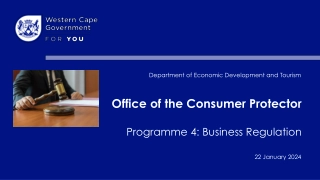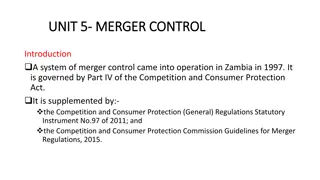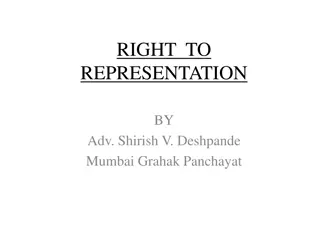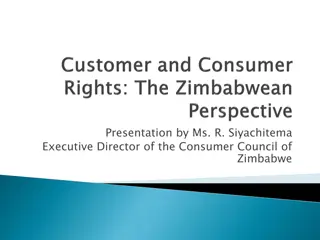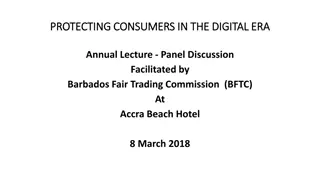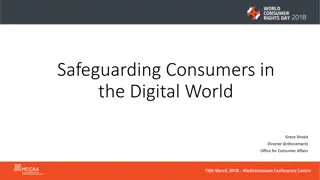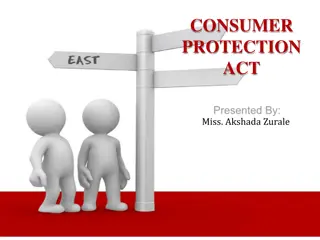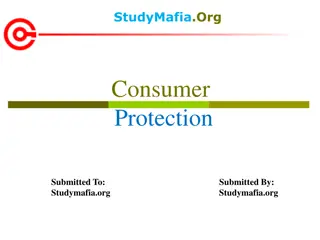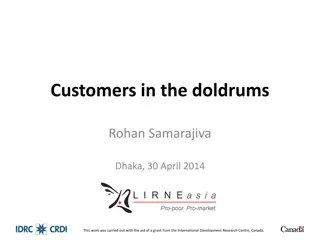Importance of Consumer Protection in Economic Activities
Consumption is the cornerstone of economic activity, encompassing daily purchases and services. Over time, consumer protection rights have evolved to safeguard consumers. The transition from "Caveat Emptor" to "Caveat Venditor" reflects a paradigm shift in buyer-seller responsibilities. International recognition of consumer protection as a fundamental right underscores its significance. The Consumers Right Protection Act of 2009 in Bangladesh establishes mechanisms for consumer redress and enforcement.
Download Presentation

Please find below an Image/Link to download the presentation.
The content on the website is provided AS IS for your information and personal use only. It may not be sold, licensed, or shared on other websites without obtaining consent from the author.If you encounter any issues during the download, it is possible that the publisher has removed the file from their server.
You are allowed to download the files provided on this website for personal or commercial use, subject to the condition that they are used lawfully. All files are the property of their respective owners.
The content on the website is provided AS IS for your information and personal use only. It may not be sold, licensed, or shared on other websites without obtaining consent from the author.
E N D
Presentation Transcript
Introduction Consumption is the end of all economic activity. Purchase of food, medicines, utilities, toys, clothings, obtaining banking services, health care services, transport services, etc, almost every daily activity falls within the concept of consumption. The practicality of this concept is widespread. Thus to protect the interest of consumers at large, consumer rights have gained particular significance over the years.
Historical background Caveat Emptor (let the buyer beware) is a principle of consumer law, which previously had the tendency of exempting the seller from liability. The then prevailing mindset was that, it was the responsibility of the buyer to be aware and evaluate the goods and service in question. But over the decades, another competing internationally recognised principle named Caveat Venditor has evolved which means let the seller beware . With time consciousness grew about the difficulties of the buyer to properly examine the goods and service.
Importance of consumer protection The concept of consumer protection is important. Internationally consumer protection aims have been recognized as fundamental rights, as early in 1973. Since 1983, every year March 15 is observed as World Consumer Rights Day . The annual celebration of the consumer movement is a means of raising global awareness about consumer rights and needs; it is a chance to demand that the rights of all consumers are respected and protected; and to protest against market abuses and social injustices which undermine those rights.
The Consumers Right Protection Act (CRPA) 2009 The Consumers Right Protection Act 2009 is a consumer protection specific enactment. It was enacted to ensure adequate consumer right protection. To fulfil and implement the objectives of this Act, a National Consumer Right Protection Council has been established. Functions of the Council include formulation of policy on consumer protection, etc. The performance and execution of decisions by the Council is assisted by a Directorate called the Directorate of National Consumers Right Protection (DNCRP).
DNCRP is a quasi-judicial body with investigatory, hearing and remedial powers. Complaints of anti-consumer activity can be directly made to this body. To ensure such protection throughout the country, the CRPA 2009 has also created a district committee in every district named District Consumers Right Protection Committee. Functions of the District committee include compliance with the direction of the Council, raising awareness, etc. Upazilla and Union Committees may also be constituted under the Act for similar purpose.
Complaint, Complainant, Manufacturer, Anti-consumer right practice Consumer Service Rights of a consumer Complaint procedure
Chapter III Directorate, Director General, etc (S.23-36) Chapter IV Offences, Punishment, etc.(S.37-56) Chapter V Trial etc. (S.57-65) Chapter VI Civil Proceedings and Remedies (S. 66-68) Chapter VII Miscellaneous (S. 69-78)
2. Criticisms Some of the major drawbacks will be highlighted below. 2.1. Unawareness 2.2. Time constraint 2.3. Criminal case cannot be filed directly 2.4. Limitation regarding adulterated or fake medicine 2.5. Limitation regarding private health care service 2.6. Limited jurisdiction
2.7. Narrow definition of anti-consumer right practice 2.8. Narrow definition of service 2.9. Limitation on technical capacity 2.9.1 Other commodities 2.10. Hearing procedure 2.11. Limited remedy 2.12. Fragmented law 2.13. No provision for digital content 2.14. High price 2.15. Sustainable consumption and production


